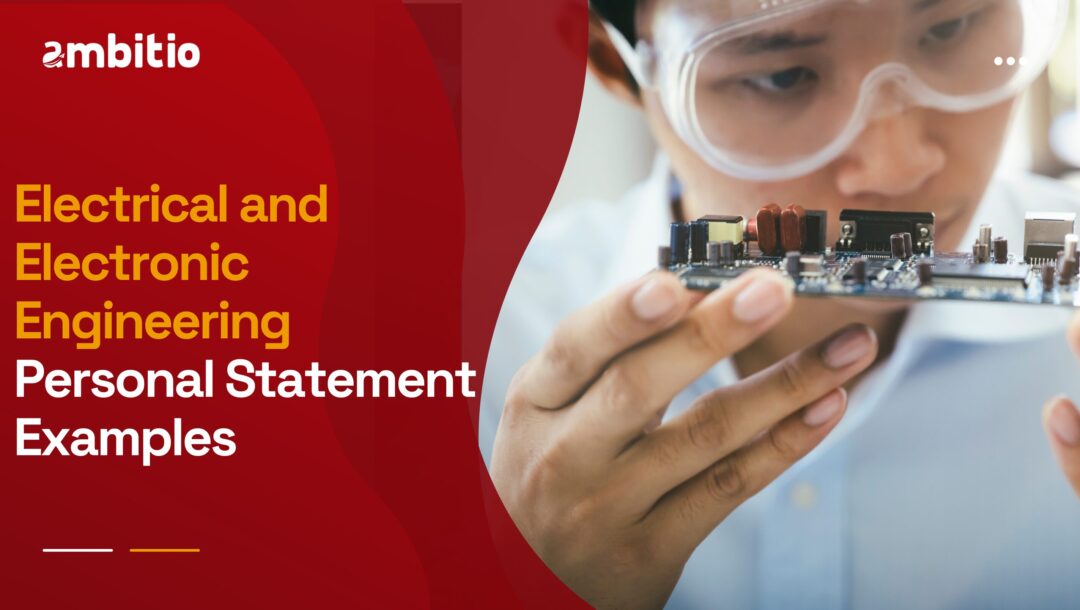1 September 2024
11 minutes read
Electrical and Electronic Engineering Personal Statement Examples

Key Takeaways:
- Show passion and understanding of electrical engineering.
- Highlight both academic and personal experiences.
- Stress the importance of problem-solving and innovation.
- Demonstrate readiness for rigorous academic challenges.
- Clearly articulate career goals within the engineering field.
Introduction:
Moving through the complex globe of admissions can be intimidating – but not for young engineers. A truly great personal statement for electrical and electronic engineering will demonstrate not only your scholarly attainments but also your enthusiasm for the discipline. This guide is a comprehensive resource on crafting your own personal statement, complete with examples of personal statements that will help you cut through the darkness and get into the light of being an electrical engineer.
What Is an Electrical Engineer?
An electrical engineer is a highly skilled professional who designs, develops, tests and oversees the production of electrical systems and equipment. This profession is essential in a variety of industries including telecommunications, energy, manufacturing, and consumer electronics. The following are the key aspects of an electrical engineer’s employment:
- Design and Development: electrical engineers create blueprints for electrical systems that power innumerable devices ranging from tiny household appliances to entire power grids. They do so by ensuring that the design is efficient, safe, and cost-effective.
- Testing and Supervision: once the engineers have created a design blueprint, they test the final prototype to ensure that it functions as planned. Electrical engineers also supervise the production, ensuring quality standards adherence.
- Innovation and Technology Advancement: they lead the way in technological development by using electrical power and electronics in new and innovative ways to improve products and services.
- Interdisciplinary Collaboration: electrical engineers cooperate with other engineers. For example, an electrical engineer might team up with mechanical engineers and computer scientists to design a new robotic system. They might collaborate with civil engineers to co-design a power-generating plant.
FACTS
“The demand for electrical engineers is projected to grow 7% from 2020 to 2030, as per the U.S. Bureau of Labor Statistics.” This growth is driven by advances in technology and the increasing scope of electrical applications in various sectors.
What Is a Personal Statement?
A personal statement is an autobiographical narrative essay that is included as part of your application to a university or college. Your personal statement should explain why you want to apply, your qualifications or achievements, and how you believe you’re the best candidate for the program. In technical courses like electrical and electronic engineering, the personal statement is an inclusive benefit that offers a rightful picture of your eligibility for the program. It can market your experiences, skills, and other angles that can be interpreted into perspectives regarding numeracy and abilities.
Key Elements of a Personal Statement:
- Introduction: At the beginning: a strong beginning to attract everyone with an interesting fact about my desire to learn electrical engineering or a short private story.
- Academic Background: Discuss your educational journey, focusing on subjects like mathematics, physics, and any engineering-related courses. Highlight any relevant projects or research work.
- Relevant Experience: Include internships, work experiences, or projects that have prepared you for a career in electrical engineering.
- Skills and Achievements: Mention any specific skills (e.g., problem-solving, teamwork, analytical skills) and notable achievements.
- Future Goals: Outline your career aspirations and how the degree will help you achieve them.
- Conclusion: Summarize your statement, reinforcing your passion and readiness for the program.
What Should Be Included in a Personal Statement for Electrical Engineering?
Creating a strong personal statement for electrical engineering involves highlighting various aspects of your background and experiences. Here’s what to include:
Academic Interests:
- Subjects: Your excitement about subjects like mathematics and physics.
- Projects: Specific projects that showed you your passion for electrical engineering could be projects on renewable energy systems, circuit design, etc.
Relevant Experience:
- Internships: Mostly internships in the field of electrical engineering can be included and then highlight your takeaways and how it prepared you.
- Research: If you’re doing research, add the research topic, your role, and the outcomes.
Future Career Goals:
- Short-term goals: what do you aim to do immediately after your degree? That can be working in a particular domain of electrical engineering or doing a more specialized study related to the field.
- Long-term aspirations: your big, long-term career goals could be innovation in renewable energy, advancement in the field of telecommunications, or whichever field within electrical engineering.
Personal Motivations:
- Passion for the field: What makes it thrilling for you? It could be the urge to understand how things work, problem-solving, and the opportunity to shape the future. It could be unique to you;
- Influences: Are there people, mentors, or prior experiences or events like science fairs that have steered you into electrical engineering?
Problem-Solving Skills:
- Examples: Provide examples where you have demonstrated problem-solving skills. This could be through academic projects, personal endeavors, or extracurricular activities.
Strong Foundation in Mathematics and Physics:
- Academic Excellence: Highlight your achievements in subjects like mathematics and physics. Explain how these have provided a strong foundation for understanding electrical engineering concepts.
Personal Attributes:
- Qualities: Emphasize personal qualities such as perseverance, attention to detail, creativity, and teamwork.
- Extracurricular Activities: Mention involvement in activities that demonstrate leadership, teamwork, or a commitment to engineering, such as participation in a robotics club or science fairs.
Example of a Personal Statement Structure:
- Introduction: captivating opening using a personal story.
- Academic background: discuss your studies providing relevant subjects.
- Relevant experience: share specific examples of internships, projects, and research.
- Skills and Achievements: Describe key skills and achievements
- Future goals: Imperative and concise short-term aspirations and possible future development
- Personal motivations: will offer insight into what inspires me to improve my knowledge in Electrical Engineering.
- Conclusion: strong closing that sums up your experience and your readiness to study.
FACTS
“Innovations in electrical engineering such as the development of flexible electronic devices are paving the way for next-generation medical implants and sensors,” according to recent research by Imperial College London. These advancements highlight the dynamic nature of the field and the continuous need for skilled engineers.
Why Do You Want to Study Electrical and Electronic Engineering?
Choosing to study electrical and electronic engineering stems from a blend of personal experiences, academic interests, and an inherent curiosity about how the world works. Many students are drawn to this field for several compelling reasons:
- Personal Inspiration: Whether it was a childhood fascination with gadgets, a mentor in the field, or an influential figure in technology, many find their calling through impactful experiences.
- Academic Foundation: A strong background in subjects like mathematics and physics often paves the way. Success and enjoyment in these areas can motivate students to pursue engineering.
- Desire to Innovate: The chance to be at the forefront of technology and innovation is a significant draw. Engineering offers the tools to create solutions that improve lives and transform industries.
Influential Experiences that Shape Career Choices:
- Early Exposure: Playing with electronics kits, participating in robotics clubs, or science fairs while still in school
- Educational Milestones: Completed advanced courses in high school or a couple of successful class projects that ignited a certain interest in electrical phenomena or electronic devices.
- Professional Encounters: Participation in internships or interaction with professional engineers could help gain a clearer understanding of what the profession is.
What Fascinates You About Electrical and Electronic Engineering?
The field of electrical and electronic engineering is vast and varied, encompassing everything from power generation to digital communications. Several aspects make it particularly captivating:
- Impact on Daily Life: daily use of technology from smartphones to sustainable power systems all powered by electrical engineering. Technology that evolves every day
- Rapid Technological Advancements: The continuous evolution in areas like semiconductors, telecommunications, and software development keeps the field exciting and ever-relevant.
- Sustainability Challenges: Developing new technologies for renewable energy sources and more efficient power systems offers a chance to tackle some of the world’s most pressing environmental issues.
Areas of Fascination:
- Innovation in Consumer Electronics: Creating smaller, faster, and more efficient devices.
- Smart Grid Technology: Enhancing the reliability and efficiency of power distribution.
- Robotics and Automation: The design and development of systems that can automate tasks traditionally done by humans.
What Are Your Career Goals in Electrical Engineering?
As students consider their future in electrical engineering, setting clear career goals can guide their educational path and professional development:
Short-Term Goals:
- Acquire Specialized Knowledge: Gain expertise in areas like circuit design, power systems, or signal processing through focused coursework and projects.
- Develop Professional Skills: Enhance skills in project management, teamwork, and communication through internships and collaborative projects.
Long-Term Goals:
- Specialization: Pursue a specialization in a high-demand area like renewable energy systems or wireless communications.
- Leadership Roles: Aim for positions that allow leading projects or teams, contributing to innovative solutions and strategic decisions within a company.
How the Degree Helps Achieve These Goals:
- Foundational Knowledge: Provides the technical knowledge necessary for specialization and advanced problem-solving.
- Networking Opportunities: Connect students with professionals, alumni, and organizations in the engineering field.
- Research and Development: Offers opportunities to participate in cutting-edge research, often in collaboration with industry leaders.
What Are the Requirements for a Personal Statement for Electrical Engineering?
Your personal statement for electrical engineering is central to your university application. It demonstrates an understanding of the field and your readiness for the academic tasks that lie ahead. Below are the key ingredients you should consider when presenting your personal statement:
Schedule Your Expert Call Now:
Ready to navigate the college application process with ease? Schedule a call with our mentor at your convenience. We’re here to offer personalized solutions and expert guidance.
Academic Background
Academic background – the root from which your application blossomed. These are the main points that you need to stress about this aspect:
- Core Subjects – when you write about your studies, you need to focus on such disciplines as mathematics and physics; they form the basis of the principles of electrical engineering.
- Relevant Courses – you probably had specific subjects or courses related to electrical and electronic engineering. Whether it is digital systems, circuit theory, or computer science.
- Projects and Research – writing about these points, you must tell about any projects or research that would illustrate your practical use of theoretical knowledge. It can be an essay on building circuits in your school assignment or a work devoted to a stand at a science fair about renewable sources of energy.
- Awards and Recognitions – if you have any achievements or awards, even an honorary award in a subject or competition, it only proves your academic qualities.
Skills and Qualities
Engineering programs are looking not only for bright students but for those who are prepared to face life challenges. Show you:
- Problem-solving Skills: discuss past activities that required creative thinking to solve problems, whether at school or personal events.
- Creativity and Innovation: show examples from school activities or hobbies where you have shown your advanced creative thinking by inventing a new gadget or upgrading an existing one.
- Analytical Skills: provide examples of work, personal activities, or scientific projects where you had to analyze data or designs and then say something about the evaluations’ results.
- Teamwork: since engineering is mainly done in teams, this skill is crucial for future applicants.
- Perseverance and Lifelong Learning: prove that you will constantly develop in engineering and show your factual actual education.
Extracurricular Activities
Apart from academic grades, the activities that you involve yourself with apart from a classroom can either make or break your application. The ideal such activities include the following:
- STEM Clubs and Societies: Join clubs or societies within and outside your school or community that participate in science, technology engineering, and mathematics. It could be a robotics club in your school or a coding society in your community.
- Competitions: Taking part in competitions such as science fairs, robotics contests, or math olympiads shows me you are competitive and your application in real life with the knowledge acquired in class shows creativity and motivation.
- Leadership Roles: If you ever held a good leadership and management post such as a captain of a team, president of a given club, or an organizer of an event demonstrates your take on responsibilities and how you are conversant with Logistics and multi-tasking.
- Community Service: If you work as a volunteer and CSR associate and what you do involves technology and science, such as learning and tutoring young students Mathematics and science shows how passionate you are about the subject and wish to enlighten other students into having the same passion.
How to Write a Personal Statement for Electrical Engineering?
Crafting a compelling personal statement for electrical engineering requires thoughtful structuring and detailed personal reflection. This section will guide you through creating a statement that showcases your qualifications, experiences, and passion for the field.
What Is the Structure of Electrical and Electronic Engineering Personal Statement?
A well-organized personal statement typically follows a clear structure:
- Introduction: Start with an engaging hook to capture the reader’s attention. This could be a personal anecdote, a unique experience, or a compelling fact about electrical engineering that drew you to the field.
- Body:
- Academic Background: Discuss your educational journey, focusing on relevant subjects like mathematics, physics, and any engineering-related courses.
- Experiences and Achievements: Highlight internships, research projects, or personal projects that are relevant to electrical engineering. Emphasize any notable achievements and what you learned from these experiences.
- Skills and Qualities: Detail the skills and personal qualities that make you a strong candidate. This includes problem-solving skills, creativity, teamwork, and a passion for lifelong learning.
- Conclusion: Reaffirm your interest in the program and your career goals. Summarize why you are a good fit for the course and how the program will help you achieve your aspirations.
Personal Statement Examples for Electrical Engineering
Example 1: The Aspiring Power Systems Engineer
Introduction: “Ever since experiencing a city-wide blackout, my fascination with electrical power systems has grown exponentially. Understanding and improving the stability and efficiency of power grids have become my academic and career focus.”
Academic Background: “Dedicated to excelling in mathematics and physics, I have consistently topped my class in these subjects, which are fundamental to electrical engineering. My senior project, which involved designing a model smart grid, was awarded the best innovative project at our annual school science fair.”
Professional Experience: “Last summer, I interned at PowerGrid Corp, where I was involved in the grid modernization project. This experience allowed me to see firsthand the challenges and complexities of upgrading aging infrastructure with new technology, reinforcing my interest in this vital field.”
Skills and Qualities: “My internship not only enhanced my technical skills in using simulation software but also improved my problem-solving abilities and my capacity to work as part of a team. I thrive in environments that challenge my analytical abilities and require a meticulous approach.”
Conclusion: “I am eager to contribute to and learn from the cutting-edge Power Systems Engineering program at [University Name]. I am committed to pursuing a career that enhances energy reliability and efficiency, helping to shape a more sustainable and technologically advanced future.”
Example 2: The Future Robotics Engineer
Introduction: “Inspired by the integration of electronics and computer science in creating autonomous machines, my goal is to advance in the field of robotics. My journey began with building simple robots for school competitions and has evolved into a deep commitment to studying Electrical and Electronic Engineering.”
Academic Background: “My coursework in computer science and advanced electronics throughout high school has prepared me well for the technical challenges of engineering. My capstone project involved creating a line-following robot that could navigate complex paths, which sparked my interest in autonomous systems.”
Professional Experience: “I volunteered at a local tech startup that specializes in robotic solutions for healthcare. Working alongside experienced engineers, I contributed to the design of a robot designed to assist elderly patients with mobility, which taught me valuable design and testing skills.”
Skills and Qualities: “Through my experiences, I have developed strong technical skills in programming and circuit design, as well as soft skills such as teamwork, leadership, and perseverance under pressure. My ability to adapt and innovate has been key in my successful project outcomes.”
Conclusion: “Attending [University Name] will equip me with the profound knowledge and practical skills needed to succeed in the evolving field of robotics. I am excited at the prospect of being part of a program that champions innovation and practical experience.”
Example 3: The Communications Technology Enthusiast
Introduction: “My fascination with electrical and electronic engineering was ignited by a school project on wireless communication technologies. This project opened my eyes to the potential of enhancing how people connect across the globe.”
Academic Background: “I have a strong foundation in physics and digital systems from my high school education, complemented by extracurricular courses in signal processing and telecommunications. My enthusiasm for this field was recognized when I received the ‘Young Innovator’ award for developing a prototype communication device that used solar power.”
Professional Experience: “During an internship at CommTech Innovations, I assisted in the development of network solutions that aimed to provide affordable Internet access in underserved regions. This experience was pivotal in understanding the real-world impacts of communication technology.”
Skills and Qualities: “My technical skills include circuit design and network configuration, and I possess a unique ability to translate complex technical concepts into understandable terms, a crucial skill for teamwork and leadership. My project management and organizational skills have allowed me to lead projects smoothly and effectively.”
Conclusion: “I am eager to join [University Name]’s esteemed Electrical and Electronic Engineering program to further my knowledge and skills in communications technology. I am determined to drive innovation in this sector, aiming to broaden access to technology globally.”
Conclusion:
A well-crafted personal statement is your gateway to demonstrating your suitability for a career in electrical and electronic engineering. It allows you to present a narrative that weaves your past experiences with your future aspirations. Remember, the key to a successful application is to convey not just your technical capabilities but your personal journey and enthusiasm for engineering.
Schedule Your Expert Call Now:
Ready to navigate the college application process with ease? Schedule a call with our mentor at your convenience. We’re here to offer personalized solutions and expert guidance.
FAQ:
What is the ideal length for an engineering personal statement?
Aim for 500 to 1000 words, ensuring clarity and conciseness.
Can I mention projects that aren’t directly related to electrical engineering?
Yes, if they demonstrate relevant skills like problem-solving or teamwork.
How technical should the personal statement be?
Balance technical details with personal insights to show both expertise and personality.
Should I focus more on academics or extracurricular activities?
Integrate both to show a well-rounded profile.
Is it necessary to mention specific engineers or theories in my statement?
Mention them if they have inspired your career choice and study interests.
How do I start my personal statement?
Begin with a personal anecdote or a compelling fact about electrical engineering.
What makes a personal statement stand out to admissions committees?
A unique personal voice and clear, specific examples of your commitment and skills.
Can I use quotes in my personal statement?
Use them sparingly; your own words are more powerful in expressing your motivations.

You can study at top universities worldwide!
Get expert tips and tricks to get into top universities with a free expert session.
Book Your Free 30-Minute Session Now! Book a call now




























